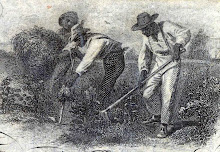
RACE - THE POWER OF AN ILLUSION, Episode Two: The Story We Tell
NARRATOR: "All men are created equal." "All men are created equal." It's the lofty and revolutionary ideal at America's core. Yet it was written at a time when some inhabitants were held in bondage, and others were being dispossessed of their lands. How did American society justify unequal treatment based on skin color and national origins? How did it reconcile that contradiction? America created a story, a story of race.

ROBIN D. G. KELLEY, HISTORIAN: Race was never just a matter of how you look, it's about how people assign meaning to how you look.
THEDA PERDUE, HISTORIAN: We have the idea that it's somewhere written in stone that there are these fundamental differences between human beings. We don't realize that race is an idea that evolves over time, that it has a history, that it is constructed by society to further certain political and economic goals.

Thomas Jefferson and his enslaved human being named Issac "Jefferson"
Thomas Jefferson, a Virginia slaveholder, penned the revolutionary words proclaiming human equality in the Declaration of Independence. He also wrote a lesser-known influential document, Notes on the State of Virginia. Written in response to questions from France about the American colonies, the book reads as a kind of sales pitch for America. Notes on the State of Virginia was not about race, but among Jefferson's descriptions of rivers and seaports, mountains and climate, he expressed his views on the inhabitants of the new land-people from America, Europe and Africa.

ACTOR (reading from NOTES ON THE STATE OF VIRGINIA): I advance it, as a suspicion only, that the blacks, whether originally a distinct race, or made distinct by time and circumstances, are inferior to the whites in the endowments both of body and mind.

PAUL FINKELMAN, HISTORIAN: It is possible to make the argument that Thomas Jefferson is the first person to truly articulate a theory of race in the United States, and in effect, he has to do so. He has said in the Declaration of Independence, that we are all created equal. Well, if in fact we're all created equal, and if in fact we're entitled to our liberty, then how can he possibly own 175 slaves, and going up to about 225 slaves at the peak of his slaveholding?
NARRATOR: In Notes Jefferson's words appeared to justify slavery at a time when many slaves were admonishing the founding fathers for espousing freedom while continuing to support a system of human bondage.
Part II The Story We Tell Chapters 1 and 2
The Story We Tell Chapters 3 and 4

No comments:
Post a Comment